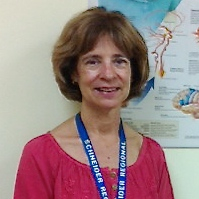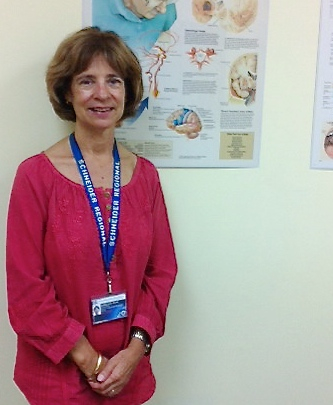

She has schooled herself in subjects that interest her patients because, if you are encouraging someone to talk, you want to have something to talk about.
And it’s not just conversation topics that vary. When it comes to treatment approaches, “it’s not one size fits all,” Grant said in a recent interview in the therapy room at Schneider Regional Medical Center.
Treatment depends in great part on the exact nature and cause of the problem, of course, but it also depends on the patient’s personality, educational background, interests and level of commitment to the process, as well as the support he or she may have from family and friends.
Grant works on a contract basis at the hospital and also at Sea View Nursing and Rehabilitation Facility. She sometimes sees patients from St. Croix, where there is no speech therapist for adults.
“It’s mostly neurological problems” that cause people to develop aphasia, a range of speech and communication disorder, she said. It’s largely stroke, but brain injury or tumors, Parkinson Disease and a host of other neurological problems can also affect a person’s ability to speak.
Another common cause is damage to the vocal chords or growths called nodules on the vocal fold. These may require surgery as well as therapy.
Sometimes it’s just a bad habit.
Grant recalled a time she suffered a relatively minor leg injury. Weeks later she was still limping – until a physical therapist colleague took a look, said the leg was completely healed and told her to stop favoring it.
The same thing can happen to people’s voices, Grant said.
“Something’s happened and they develop a habit” – it may be coughing when there is no reason, hoarseness or speaking in an unnatural pitch. The change probably was so gradual they didn’t realize it was happening. Exercises can help but at the heart of a cure is the patient’s awareness that he or she controls what’s happening.
While damage from a stroke is more complex, sometimes altering cognitive processes and/or paralyzing facial muscles used for speech, the patient can still exercise some control, but it won’t be easy.
“You have to do something. It’s an active thing,” Grant said. “You can’t just sit and watch TV” and hope that eventually you will have a full recovery.
The first thing Grant does is to assess the patient’s functioning on several levels, including memory, thinking, language comprehension and use of speech. “You have to separate out; is it speech (which has a mechanical component) or is it language” that’s most affected.
“You try to get the person to be their own therapist in a way … to take some ownership” of their therapy, Grant said. A patient may have to struggle to find a word, for instance, but in doing that, he’s working things out. It can help to give him a hint – perhaps the initial sound of the word – but it doesn’t help just to supply the word or to pretend there is no problem. “You have to find out what clues work with that person.”
Grant also works with the patient’s family, who can be vital to his progress.
“Success isn’t always full recovery,” she noted. “Sometimes it’s learning to be happy with themselves” – accepting that circumstances have changed and making as much improvement as possible.
While she’s devoted much of her life to speech therapy, it wasn’t Grant’s first choice.
“In high school, I was going to be a French teacher,” she said. But after a year of college, a teacher advised her that comprehension was good, but her speech needed work. He advised a year of immersion in France, but her grandmother – who was generously supporting her education – didn’t like that idea.
“It’s probably the best thing that happened,” she said. “I went back (to school) and pulled out the catalog and started with the A’s” looking for a new major. When she got to speech therapy, she thought it looked interesting. “So I took the first semester, and I was just fascinated.”
She earned her degrees, including a master’s degree, from Southern Methodist University in Texas and worked on the mainland from the mid-70s until moving to St. Thomas in 1994.
“I knew pretty quickly that I wanted to work with adults,” she said; she was fascinated seeing her mentor work with an aphasic patient.
Children face a whole different set of problems, including developmental delays that are sometimes the first sign of physical disabilities or conditions, or even a lack of socialization. Grant has worked only briefly with children, including a stint volunteering with Head Start when Hurricane Marilyn in 1995 left the program in dire need.
She had advice for anyone planning a career: consider speech therapy. It requires educational commitment, but in human terms, the rewards are priceless.